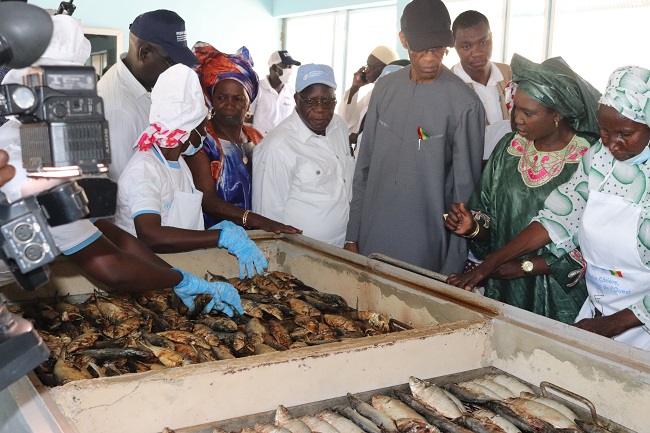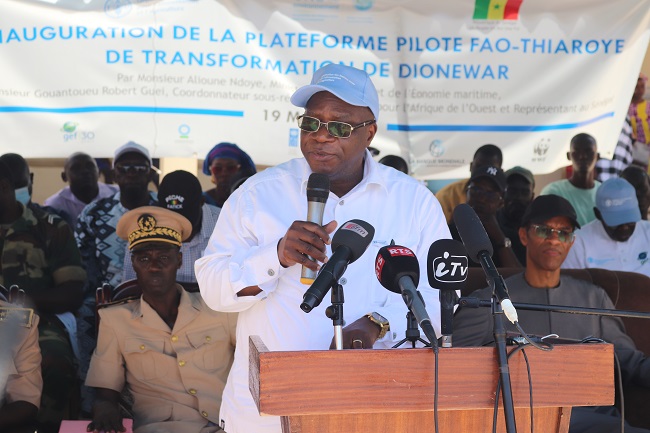Regional exchange visit spotlights women in artisanal fisheries
The event was organized by the FAO Coastal Fisheries Initiative in West Africa to strengthen the capacities of women fish processors and sellers in Cabo Verde, Côte d'Ivoire and Senegal
24/05/2022

Group photo©FAO_Lala Ndiaye
24 May 2022, Dakar/Rome - The Coastal Fisheries Initiative in West Africa (CFI-WA) organized a regional exchange visit in which Senegal hosted women fish processors and sellers from Cabo Verde and Côte d'Ivoire from May 18 to 22.
The visit built on a series of national exchange visits that took place in the three countries in January and February this year and is part of the Global Plan of Action of Fisheries and Artisanal Aquaculture (IYAFA 2022).
IYAFA 2022 “is an important act of recognition of the millions of small-scale fishers, fish farmers and fish-workers who provide safe and nutritious food to billions of people and help achieve the Zero Hunger agenda," the Minister of Fisheries and the Maritime Economy of Senegal, Mr. Alioune Ndoye, stated during the visit.
 |
Women, a potential to be valued
Women play important roles in the post-harvest sector of artisanal fisheries in West Africa. These include the sale of fresh fish as well as processing, storing, packaging and marketing dried, salted, and smoked fish products.
However their working conditions expose them to a number of dangers, in a field where health standards are almost non-existent. Their means of production are often rudimentary, their labor is underpaid and their contributions to the economy are underestimated.
"An exchange visit between women processors highlights the enormous challenges they face every day," commented IYAFA 2022 representative Paula Anton.
“They have had similar experiences, they go through the same difficulties and can therefore express themselves and understand each other. This can help make their job easier in the future,” she added.
Sharing knowledge to improve working conditions
The purpose of the visit was to enable women fish processors and sellers from the three countries to share their experiences and good practices in organizing, processing and marketing in order to make their work safer, easier and healthier.
An additional goal was to achieve quality fish products that can appeal to a greater number of consumers, to the economic benefit of the women and their communities.
“Today, each country has seen how things are done in the other countries. Each learned from her peers, and we will use these experiences to improve our work,” commented Mrs. Elisabeth Abo, fish processor and member of the women's delegation from Côte d'Ivoire.
“We learned a lot and we appreciated the work of these brave women,” according to Germana dos Santos Soares from the New Generation Association of Fishermen of São Pedro in Cabo Verde. “When I get back to my country, I will share this new knowledge with my sister processors."
Inauguration of a new FAO FTT oven unit
During the visit, a new unit of three FAO Thiaroye Transformation (FTT) ovens was inaugurated in the presence of Mr. Ndoye and of the Coordinator of the Subregional Office for West Africa and FAO Representative in Senegal, Mr. Robert Guei.
 |
FTT ovens significantly reduce workers' exposure to harmful heat, burns and smoke, provide consumers with safe, quality products and help protect the environment by reducing post-capture losses, pollution and the amount of wood used as fuel.
"We are extremely happy to know that the inauguration of this pilot seafood processing unit will enable local fishing communities to increase their income," commented Mr. Guei.
 |
“It will improve the livelihoods of women processors and those of their households at the same time, while reducing their work-related hardships and the risk of accidents,” he added.
About the CFI
Empowering women in the small-scale fisheries value chain is fundamental to realising the CFI's goal of developing more holistic processes and integrated approaches in the sustainable management of coastal fisheries by sharing best practices and lessons learned at national, regional and global levels, and also to replicate and scale up these innovative approaches.
The CFI-WA project is funded by the Global Environment Facility (GEF). It is implemented by FAO and the United Nations Environment Program (UNEP) through the Abidjan Convention.
